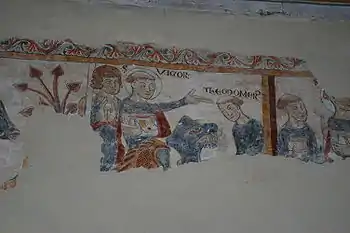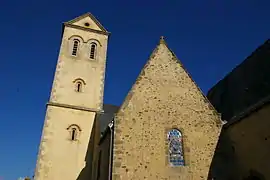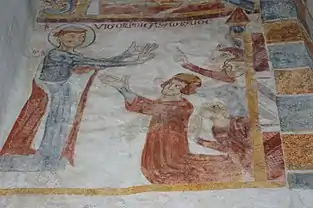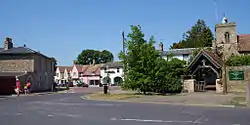Saint Vigor
Saint Vigor (French: Saint Vigor, Vigeur; Latin: Vigor, Vigorus) (died circa 537 AD) was a French bishop and Christian missionary. An early vita was composed about 750–775, probably in Bayeux, where he had been bishop and was venerated from an early date.[1] Born in Artois, he studied at Arras under Saint Vedast. His noble father, preoccupied with worldly prestige, would not grant approval for him to become a priest, so he ran away from home, taking nothing with him, accompanied by an acolyte, Theodimir. Thereafter, he became a hermit preacher at Reviers, Calvados,[2] and worked as a missionary. Saint Vigor was named bishop of Bayeux in 514.[3]
Saint Vigor | |
|---|---|
 Fresco at the Church of St Vigor de Neau | |
| Born | Artois |
| Died | circa 537 AD |
| Venerated in | Eastern Orthodox Church Roman Catholic Church |
| Feast | November 1 |
He fervently opposed paganism and founded a monastery, later known as Saint-Vigor-le-Grand. In Bayeux, Normandy, he destroyed a pagan temple that was still in use and built a church on the grounds.
Veneration
In Normandy, Vigor was venerated and churches are dedicated to him. Normandy was the site for the establishment of his cult after the successful Norman conquest of England. Two English churches have been dedicated to Vigor; one in Fulbourn, Cambridgeshire, the other in Stratton-on-the-Fosse, Somerset.[4] His feast falls on All Saints' Day (November 1), and as a result is often moved to another date.[5] Saint Vigor is mentioned in the life (vita) of Saint Paternus.[5]
 Statue of Saint Vigor
Statue of Saint Vigor
 Fresco at the Church of St Vigor de Neau.
Fresco at the Church of St Vigor de Neau. Église Saint-Vigor at Marly-le-Roi, Île-de-France
Église Saint-Vigor at Marly-le-Roi, Île-de-France Church of St Vigor with All Saints at Fulbourn, England
Church of St Vigor with All Saints at Fulbourn, England
Notes
- Vita Sancti Vigoris
- ad vicum quemdam qui vocatur Redeveris (Vita).
- Edit, Fulbourn and the Wilbrahams | powered by Church. "Fulbourn and the Wilbrahams - History of Fulbourn churches".
- "Detailed Record".
- "saintpatrickdc.org".